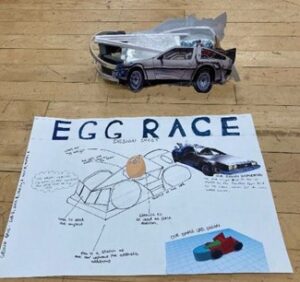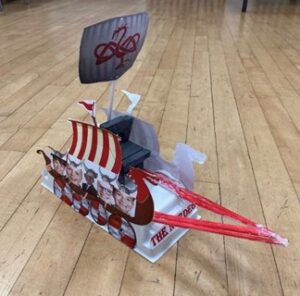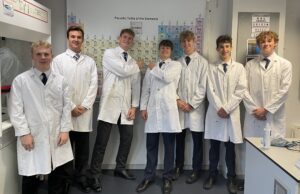This year has seen some outstanding results by RGS Guildford students in a variety of different challenges
Design Technology
A highlight of the DT year at the RGS is ‘The Great Egg Race’ – a challenge to design, build and race a vehicle using limited time and resources. Many of the vehicles looked like they wouldn’t last long under the pressure of the impact testing. Two vehicles however seemed really hard to destroy: whittling down the pack to a single remaining car proved tough, so the winning vehicle which survived the most impacts, created by Dan Vovcenco, Karam Sabbagh, Alexis Solomonides and Zac Winn-Smith was most impressive.
There was also a prize for the best design page. The “Back to the Future” inspired Delorean design page created by the team comprising: Luke Barrett, Thomas Bowen, Makisig Akiwumi, Sebastian Broughton and Matt Boston was declared the worthy winner.
The final award was for the best styling of the vehicle and, again, there were a number of really great designs this year with the prize awarded to Caspar Edwards-Davies, Joshua Horsnell, Rowan Groenewald, Tim Hatch and Orlando Grover. Their design was based on a Viking long boat and cleverly featured all of the group members’ faces on it.



Mathematics
The Senior Maths Challenge is taken nationally by around 200,000 students. Freddie Weir (Upper Sixth Form) and Yuvan Raja (Fifth Form) both achieved full marks, an exceptional feat correctly answering all 25 challenging questions in 90 minutes. Henry Franke correctly answered 24 of the 25 questions. These students as well as Kush Patel (Lower Sixth Form) qualified for the British Mathematics Olympiad Round 1 (BMO1).
BMO1 is a difficult paper consisting of 6 problems to be solved in 3 and a half hours. Its level of challenge is made clear by the fact that 15% of entrants score 5/60 or fewer marks! Yuvan Raja scored 52/60 placing him in the top 50 students in the country – a phenomenal achievement. Yuvan was awarded a silver medal for his achievements, and to qualify for BMO2 as a Fifth Former is exceptional. Henry Franke (31/60) was awarded a distinction in BMO1, placing him in the top 25% of performers, whilst Freddie Weir (28/60) just missed out on this accolade but nevertheless posted an excellent result.
Yuvan’s first foray into BMO2 was a success, scoring full marks on the first question and eventually achieving 17/40. As Yuvan continues to develop his knowledge and skills there is no doubt he will continue to improve on what is an already amazing base.
In the Intermediate Maths Challenge taken by Third to Fifth Formers nationally, RGS Guildford again found success with a number of students qualifying for the subsequent Olympiad rounds.
Julian Zou (113/135), James Kelynack (112/135) and Sam Millington (101/135) all qualified for the Cayley Olympiad for Third Form, Jack Thomson (111/135) for the Hamilton Olympiad for Fourth Form whilst Yuvan Raja continued his fine success with 135/135 and qualified for the Maclaurin Olympiad for Fifth Form.
All three Third Form students found success in their Olympiad round achieving merits, awarded to the top 50% of entrants. Yuvan Raja scored 52/60 in his Olympiad, one of the top scores nationally and as such was awarded a gold medal and a book prize.
In the Junior Maths Challenge taken by all Second formers, there were two standout performers, Alex Aylward and Rajvir Mangat who scored 124 and 123 out of 135 respectively, qualifying them for the Junior Mathematics Olympiad. Of notable mention is Samuel Webb who narrowly missed out scoring 118/135.
Computer Science
RGS Guildford students undertake a number of computing competitions each year, with the British Informatics Olympiad and the British Algorithmic Olympiad the premier competitions. Students also compete in Bebras and its follow-on rounds Oxford University Computing Challenge as well as the Perse Coding challenge with encourages students to work as a team.
In the British Informatics Olympiad, there were 12 entrants from varying year groups, with Yuvan Raja (Fifth Form) scoring 90/100 and qualifying for the final round and an excellent performance also from Adam Wang (Upper Sixth) with 70/100. An honourable mention goes to Mahil Vasanth (Lowe Sixth) who scored 34/100.
The final round of the Informatics Olympiad is a selection camp at Trinity College Cambridge. As well as serving a function for selection for the team to compete in the International Informatics Olympiad, the camp provides an excellent opportunity for like-minded students to meet and learn new skills and tricks. Yuvan performed to a very high standard at the camp, and whilst missing out on selection this year will have another two opportunities in future years to do so.
The British Algorithmic Olympiad is a new competition in its second year which tests across the spectrum of mathematics and computing, and is probably the most challenging competition of all. Around 30% of students who take the challenge score between 1 and 5 marks out of 100, with a significant number scoring 0!
Eight students participated in the competition this year with Freddie Weir (Upper Sixth) and Yuvan Raja (Fifth Form) scoring 48/100 and 46/100 respectively in the first round which qualified them for the final round of the competition. Here, Freddie Weir (40/45) performed exceptionally well placing second nationally, whilst Yuvan Raja (35/45) was in the top 5-10 students nationally.
Each year the entire Third Form participate in the Bebras computational thinking competition alongside around 10 students from other year groups. The competition tests the students’ ability to think computationally, such as using and interpreting algorithms and problem-solving skills. The school performs well in this competition, with typically around 50% of our students qualifying for the next round (OUCC1).
In OUCC1, there were some standout performances, with Samuel Millington being awarded a distinction and Tom Chertkow a merit from 3rd Form. In the Fourth and Fifth Form, Paddy Cooper and Marcus Perkin were both awarded a merit, whilst Yuvan Raja scored full marks and qualified for OUCC2. In the Sixth Form, Adam Wang scored 53/68 and narrowly missed out on OUCC2, whilst Freddie Weir scored 68/68 and qualified.
The Perse coding challenge is an excellent opportunity for students to work together, and the room is often lively during the challenge! 8 teams of 2 students competed in the first round with 5 teams making it through to round 2. In round 2, the team comprised of Yuvan Raja and Ronit Sachdeva (Fifth Form) together with Julian Zou (Third Form) were our best performers, reaching the top 100 teams out of nearly 1000 who competed.
Chemistry
13000 students took part in the Cambridge Chemistry Challenge this year, and the RGS once again achieved an excellent set of results. In total we won 9 Gold, 11 Silver, and 7 Copper Awards. Yuvan Raja (5B) came top with his incredible score of 46, and Ronit Sachdeva (5A) also got a high Gold. Their scores are exceptional as they haven’t even started A Level. Congratulations to Joel Sellers, Alex Mann, and Sam Thevenon for coming top in the Lower Sixth cohort. Joel wins the Chemistry Silver Cup for being the top Lower Sixth student in both the C3L6 and in the Olympiad.
English
The 200 Seconds competition is open to all students in the First and Second Forms. The task is to give a speech of exactly 200 seconds long based around the competition’s theme, which this year was The Unexpected. In a further twist, the speech must be accompanied by a presentation of 10 slides, each of which is shown for exactly 20 seconds before transitioning automatically. The students must plan their speech to match the timing of the slides carefully.
This year’s theme prompted presentations on topics ranging from Shrek to space, from AI to atom bombs, and even included a mass-murdering monkey! Following tutor group rounds and semi-finals, five students were selected for the final: Ishaan Ansar and Cameron Sibbald from the First Form; Sam Low, Rory Mitchell and Samuel Webb from the Second Form. We were so impressed by their confident, engaging presentations, despite the audience including not only the whole of the First and Second Forms, but also the panel of judges and several staff.



